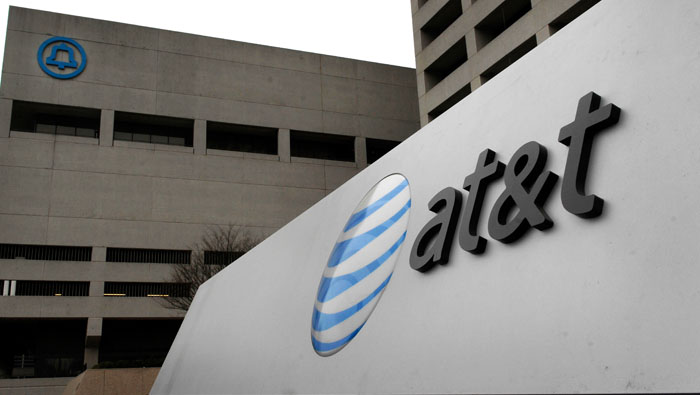
New York: Rise of millennial cord-cutters has now made its most definitive mark on corporate America: The $85 billion marriage of telecom giant AT&T and media juggernaut Time Warner. And reverberations of the deal unveiled on Saturday will resonate the most in corner offices across Hollywood's biggest television and film lots.
The company established by inventor Alexander Graham Bell in 1879 that survived radical changes in the telephone industry has just come rushing into the modern media age. AT&T’s acquisition will provide customers with a massive amount of content to beam to its wireless, broadband and satellite TV customers. Buying Time Warner - itself dating back to when Albert, Sam, Harry and Jack Warner incorporated their fledgling movie studio in 1923 - gives AT&T access to programming from HBO, Warner Bros., and networks CNN, TBS and TNT.
The combination puts all of Hollywood on notice about how to navigate a quickly shifting media landscape - deal or no deal? Only cable giant Comcast, which in 2011 acquired NBC and Universal Pictures, harnesses the same kind of firepower in delivering content directly to viewers. But it throws into question how everyone from Rupert Murdoch's 21st Century Fox to cable baron John Malone's control of Lionsgate/Starz might respond.
"Premium content always wins. It has been true on the big screen, the TV screen and now it's proving true on the mobile screen," said AT&T chief executive Randall Stephenson after the deal was announced. "We'll have the world's best premium content with the networks to deliver it to every screen."
The boards of AT&T and Time Warner were in talks for months before reaching a final agreement this weekend, according to people familiar with the negotiations. The acquisition is one of the most lucrative of the year, handing Time Warner shareholders $107.50 a share in a cash-and-stock transaction that represents a more than 40 per cent premium to where shares traded last week.
Putting the deal in perspective for the entertainment industry, the acquisition could bring massive benefits to AT&T's 45.5 million DirecTV and U-verse viewers along with 142 million wireless subscribers. It would give AT&T rights to hits like Game of Thrones, Westworld and True Detective, along with Warner Bros. film legacies such as Batman and Harry Potter. AT&T can also tap into HBO's 130 million cable and online streaming subscribers.
"Combining with AT&T dramatically accelerates our ability to deliver our great brands and premium content to consumers on a multiplatform basis and to capitalize on the tremendous opportunities created by the growing demand for video content," said Time Warner chief executive Jeff Bewkes.
Indeed, the deal marks a pivotal moment for Bewkes since he took stewardship of Time Warner in 2007. He pledged to shareholders two years ago that the company was worth remaining independent in the face of an $80 billion near-hostile takeover attempt by Murdoch, holding steadfast to the belief a more lucrative deal could be had.
Analysts say Bewkes, long considered a managerial placeholder until he could find just the right suitor, has been cautious about striking just any deal. On one side, Bewkes has been hampered by the disastrous combination with AOL more than 16 years ago that has continued to spook Wall Street. Yet, on the other side, he's watched idly as rival Disney picked off top Hollywood brands like Marvel, Luscasfilm and Pixar.
Shareholders have given Bewkes extraordinary leeway, especially considering earnings are up 15 percent this year despite a disappointing performance by its flagship Warner Bros. film studio. The company also has pacified Wall Street by returning $29 billion to investors in the form of stock buybacks and dividends since he took office. So, analysts contend AT&T's comes at the right time.
"The AT&T, Time Warner deal will succeed," said Southbay Research's Andrew Zatlin, who runs the website Moneyball Economics. "The other mergers were ideas -- a field of dreams vision where somehow, someway the companies would discover synergies." He believes the combination already is "vertically integrated in all but name."
AT&T and Time Warner would have about a year before federal regulators approve or reject the idea. But, the biggest headwind might come from rapidly deteriorating conditions for both cable companies and the programmers that depend on them.
Traditional audiences are dropping off: Some 1.4 million U.S. customers cancelled paid television subscriptions in the past year, according to research house SNL Kagan. TBS and TNT, two of Time Warner's flagship networks, have five million fewer viewers today than it did five years ago, according to Nielsen data.
A bulk of the losses are viewers cutting their cable and satellite bills by switching to streaming service like Netflix, Hulu, Amazon and others to view content. Profits are eroding at entertainment companies that rely on subscription-based television customers to power earnings, such as Disney's dependence on sports giant ESPN.